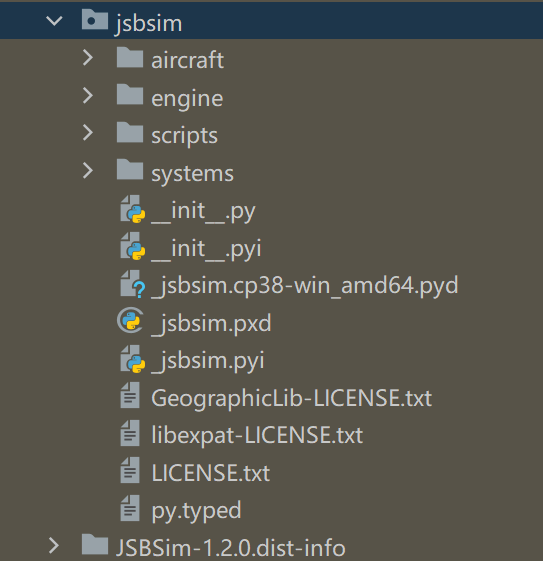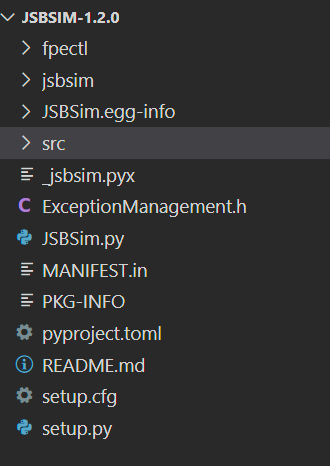动机
由于jsbsim中的某些函数总是打印出一些烦人的文本,同时为了方便改写多进程代码,需要去了解该外部库的底层原理。
创建一个自己的库
学习别人的库最好的方式先打造一个自己的库,看看需要用到什么东西。
pip install是在PyPI仓库中下载软件包,所以创建自己的库需要发布到这个仓库中。
首先创建一个项目,项目的目录结构如下
├── yourtool_name 目录
│ └── db 目录
│ ├── __init__.py
│ └── your_code.py 工具类
├── requirements.txt 依赖库
├── setup.py 安装脚本
├── README.md 说明文档
├── upload_pypi.sh 上传到官方PyPI仓库脚本
├── upload_pypi_test.sh 上传到官方测试PyPI仓库脚本在your_code编写你的pyhton代码尽量采用PEP规范。比如下面定义了一个类。
class your_class:
def __init__(self):
pass然后为了import方便,在__init__.py中将对外部暴露的报名规范
from .db.your_code import your_class测试结果没问题后,编写发布库setup.py文件。(其中用到了setuptools后面介绍)
import setuptools
import re
import requests
from bs4 import BeautifulSoup
package_name = "yourtool_name"
def curr_version():
# 方法1:通过文件临时存储版本号
# with open('VERSION') as f:
# version_str = f.read()
# 方法2:从官网获取版本号
url = f"https://pypi.org/project/{package_name}/"
response = requests.get(url)
soup = BeautifulSoup(response.content, "html.parser")
latest_version = soup.select_one(".release__version").text.strip()
return str(latest_version)
def get_version():
# 从版本号字符串中提取三个数字并将它们转换为整数类型
match = re.search(r"(\d+)\.(\d+)\.(\d+)", curr_version())
major = int(match.group(1))
minor = int(match.group(2))
patch = int(match.group(3))
# 对三个数字进行加一操作
patch += 1
if patch > 9:
patch = 0
minor += 1
if minor > 9:
minor = 0
major += 1
new_version_str = f"{major}.{minor}.{patch}"
return new_version_str
def upload():
with open("README.md", "r") as fh:
long_description = fh.read()
with open('requirements.txt') as f:
required = f.read().splitlines()
setuptools.setup(
name=package_name,
version=get_version(),
author="Author's name", # 作者名称
author_email="xxxxxxx@163.com", # 作者邮箱
description="Python helper tools", # 库描述
long_description=long_description,
long_description_content_type="text/markdown",
url="https://pypi.org/project/yourtools/", # 库的官方地址
packages=setuptools.find_packages(), #包含的所有py文件
data_files=["requirements.txt"], # yourtools库依赖的其他库
classifiers=[
"Programming Language :: Python :: 3",
"License :: OSI Approved :: MIT License",
"Operating System :: OS Independent",
],
python_requires='>=3.6',
install_requires=required,
)
def write_now_version():
print("Current VERSION:", get_version())
with open("VERSION", "w") as version_f:
version_f.write(get_version())
def main():
try:
upload()
print("Upload success , Current VERSION:", curr_version())
except Exception as e:
raise Exception("Upload package error", e)
if __name__ == '__main__':
main()正式发布之前,建议先把库发布到PyPI的测试环境:https://test.pypi.org,编写发布测试脚本upload_pypi_test.sh
#!/bin/zsh
rm -rf ./build
rm -rf ./dist
rm -rf ./yourtools.egg-info
python3 setup.py sdist bdist_wheel #打包
python3 -m twine upload --repository-url https://test.pypi.org/legacy/ dist/* #发布在测试环境中的库可以通过下面命令进行测试:pip install -i https://test.pypi.org/simple/yourtools
测试没问题后,编写发布脚本upload_pypi.sh
#!/bin/bash
# Upload project to pypi
rm -rf ./build
rm -rf ./dist
rm -rf ./yourtools.egg-info
python3 setup.py sdist bdist_wheel #打包成wheel库
python3 -m twine upload dist/*setuptools
在前面的步骤可以看到很重要的步骤就是用setuptools将所有文件打包,这里介绍一些打包步骤。
- 安装:
sudo apt-get install python-setuptools - 使用:在文件中编写一个setup.py
from setuptools import setup, find_packages
setup(
name = "demo",
version = "0.1",
packages = find_packages(),
)待补充…
jsb目录结构

比较重要文件树如下
其中:
- jsbsim.py为jsbsim库的入口文件,通过这个文件可以调用jsbsim库中的所有功能。
- __init__.py:由 Cython 编程语言 “编写” 而成的 Python 扩展模块头文件。.pxd 文件类似于 C 语言的 .h 头文件,.pxd 文件中有 Cython 模块要包含的 Cython 声明 (或代码段)。
- _jsbsim.pxd:jsbsim库的Cython文件,通过这个文件可以将jsbsim库中的C++代码转换为Python代码。
- _jsbsim.c:jsbsim库的C文件,通过这个文件可以将jsbsim库中的C++代码转换为C代码。
init.py
首先看文件__init__.py
其内容如下:
from ._jsbsim import (
__version__,
BaseError,
FGAerodynamics,
FGAircraft,
FGAtmosphere,
FGAuxiliary,
FGEngine,
FGFDMExec,
FGGroundReactions,
FGJSBBase,
FGLGear,
FGLinearization,
FGMassBalance,
FGPropagate,
FGPropertyManager,
FGPropertyNode,
FGPropulsion,
GeographicError,
TrimFailureError,
ePressure,
eTemperature,
get_default_root_dir,
)__init__.py文件中导入了jsbsim库中的所有模块,因此可以直接使用这些模块中的函数。
_jsbsim.pxd
采用cpython编写,主要是引入C++代码中的各个类和函数
#从C++标准库中导入常见类型
from libcpp cimport bool
from libcpp.string cimport string
from libcpp.memory cimport shared_ptr
from libcpp.vector cimport vector
from cpython.ref cimport PyObject
#从ExceptionManagement.h文件中导入base_error对象指针或函数
cdef extern from "ExceptionManagement.h":
cdef PyObject* base_error
cdef PyObject* trimfailure_error
cdef PyObject* geographic_error
cdef void convertJSBSimToPyExc()
#从initialization/FGInitialCondition.h文件中将JSBSim::FGInitialCondition命名为c_FGInitialCondition
cdef extern from "initialization/FGInitialCondition.h" namespace "JSBSim":
cdef cppclass c_FGInitialCondition "JSBSim::FGInitialCondition":
c_FGInitialCondition(c_FGInitialCondition* ic)
bool Load(const c_SGPath& rstfile, bool useAircraftPath)_jsbsim.cp32-win_amd64.pyd
该文件为python的动态加载文件,通过python的工具将C代码编译成二进制形式,从而提升python程序性能。所以前面的_jsbsim.pxd导入的类和函数都来源于这里。
github源码
由于采用了动态加载文件的形式无法看到其内部源码,所以去其官网查看其具体的代码。
去PyPI中下载其源代码。其文件目录为

在src目录中能够找到相应的C++目录
通过全局搜索找到了烦人文本出现的代码段
bool FGEngine::Load(FGFDMExec *exec, Element *engine_element)
{
Element* parent_element = engine_element->GetParent();
Element* local_element;
FGColumnVector3 location, orientation;
auto PropertyManager = exec->GetPropertyManager();
Name = engine_element->GetAttributeValue("name");
// Call ModelFunctions loader
FGModelFunctions::Load(engine_element, exec, to_string((int)EngineNumber));
// If engine location and/or orientation is supplied issue a warning since they
// are ignored. What counts is the location and orientation of the thruster.
local_element = parent_element->FindElement("location");
if (local_element)
cerr << local_element->ReadFrom()
<< "Engine location ignored, only thruster location is used." << endl;
local_element = parent_element->FindElement("orient");
if (local_element)
cerr << local_element->ReadFrom()
<< "Engine orientation ignored, only thruster orientation is used." << endl;
// Load thruster
local_element = parent_element->FindElement("thruster");
if (local_element) {
try {
LoadThruster(exec, local_element);
} catch (std::string& str) {
throw("Error loading engine " + Name + ". " + str);
}
} else {
cerr << "No thruster definition supplied with engine definition." << endl;
}
ResetToIC(); // initialize dynamic terms
// Load feed tank[s] references
local_element = parent_element->FindElement("feed");
while (local_element) {
int tankID = (int)local_element->GetDataAsNumber();
SourceTanks.push_back(tankID);
local_element = parent_element->FindNextElement("feed");
}
string property_name, base_property_name;
base_property_name = CreateIndexedPropertyName("propulsion/engine", EngineNumber);
property_name = base_property_name + "/set-running";
PropertyManager->Tie( property_name.c_str(), this, &FGEngine::GetRunning, &FGEngine::SetRunning );
property_name = base_property_name + "/thrust-lbs";
PropertyManager->Tie( property_name.c_str(), Thruster, &FGThruster::GetThrust);
property_name = base_property_name + "/fuel-flow-rate-pps";
PropertyManager->Tie( property_name.c_str(), this, &FGEngine::GetFuelFlowRate);
property_name = base_property_name + "/fuel-flow-rate-gph";
PropertyManager->Tie( property_name.c_str(), this, &FGEngine::GetFuelFlowRateGPH);
property_name = base_property_name + "/fuel-used-lbs";
PropertyManager->Tie( property_name.c_str(), this, &FGEngine::GetFuelUsedLbs);
PostLoad(engine_element, exec, to_string((int)EngineNumber));
Debug(0);
return true;
}


